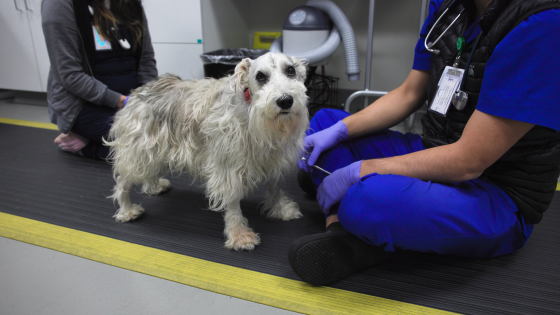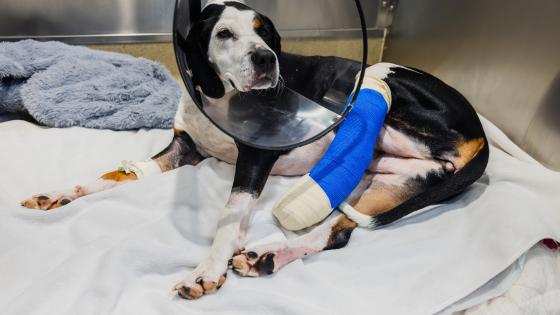
Spring Pet Safety Tips
Spring is in the air! As the days get longer and warmer, it's time for fresh starts—whether that means tackling spring cleaning, sprucing up the garden, or just enjoying more time outdoors. But before you dive into the season, take a moment to think about your animal family members. Spring brings new hazards that can put pets at risk, so here are some key things to watch out for to keep everyone safe and happy!
Spring Cleaning & Home Improvement
Pets are naturally curious, which can be adorable, but also a little dangerous, especially when you're deep in spring cleaning or home projects. Many household cleaners contain chemicals that can cause stomach upset, skin irritation, or even more serious reactions if ingested. Paints, solvents, insulation, and small hardware like nails or screws should also be kept well out of reach. When in doubt, store everything securely and opt for pet-safe cleaning products when possible!
Spring Décor & Holiday Treats
Easter decorations and treats can be fun for humans but dangerous for pets. Chocolate (even white chocolate) is toxic to dogs and cats, and foil-wrapped candies can pose choking hazards. Easter grass, the shiny plastic strands in baskets, can lead to dangerous intestinal blockages if swallowed. Flower bouquets around the home can also be dangerous for pets. Lilies, one of the most common flower toxicities we see at DoveLewis, are incredibly toxic to cats. Even a small amount of pollen or a single bite of a leaf can cause kidney failure. If you suspect your pet has ingested a toxic plant, seek veterinary care immediately. View ASPCA's list of toxic and non-toxic plants for pets for more information.
Puddles & Standing Water
While puddles might look like a tempting drink station for dogs, they can harbor bacteria, parasites, and chemicals. Leptospirosis, a bacterial infection found in contaminated water, can cause kidney and liver disease in dogs. Try to steer your pup away from drinking from puddles, slow-moving streams, or standing water to keep them safe.
Gardening
Spring is the perfect time to start planting, but make sure your garden is pet-friendly. Many fertilizers, insecticides, and herbicides can be toxic if ingested. Plus, some of the season’s most popular flowers—azaleas, daffodils, rhododendrons, tulips, and hyacinths—can be dangerous for pets. Watch for signs of poisoning, like vomiting, drooling, or lethargy, and seek veterinary care if your pet gets into something they shouldn’t.
Seasonal Allergies
Just like us, pets can suffer from seasonal allergies caused by pollen, mold, and dust. If you notice your pet sneezing, itching, licking excessively, or developing skin irritation, they might be dealing with spring allergies. Some pets even experience respiratory issues. Talk to your vet about treatment options to help ease their discomfort.
Rodent Control Risks
Springtime means increased rodent activity, and many people turn to rodenticides (rat and mouse bait) to keep them in check. These poisons can be fatal to pets, even if they don’t ingest them directly; eating a poisoned rodent can still be deadly. If you need to use rodent control, opt for pet-safe alternatives and make sure any products are completely out of reach.
Flea, Tick & Heartworm Prevention
As temperatures rise, fleas, ticks, and mosquitoes become more active, bringing the risk of Lyme disease, heartworm, and other serious illnesses. If your pet isn’t already on a year-round parasite prevention plan, now’s the time to start. Check with your vet for recommendations, and if you and your pet spend time outdoors, be sure to do regular tick checks.
Window & Screen Safety
Spring breezes are great, but open windows can be risky for pets, especially cats. "High-rise syndrome" refers to injuries from falls out of open windows, which can cause serious trauma. Before opening your windows or patio doors for fresh air, double-check that screens are sturdy and secure.
Gradual Increase in Activity
If your pet has been in hibernation mode over the winter, ease them back into an active routine. A sudden jump in exercise can lead to injuries or strain, especially for older pets or those with joint issues. Start slow with shorter walks or play sessions and build up their endurance over time.
If you suspect your pet has ingested a toxic substance or is showing signs of poisoning, contact your veterinarian immediately or head to DoveLewis, which is open 24/7. You can also reach the ASPCA Animal Poison Control Center at (888) 426-4435 for expert guidance. By keeping these springtime hazards in mind, you can ensure a safe and enjoyable season for both you and your pets!




